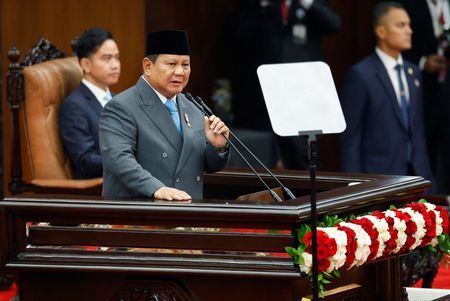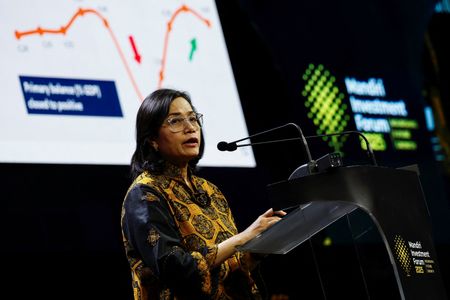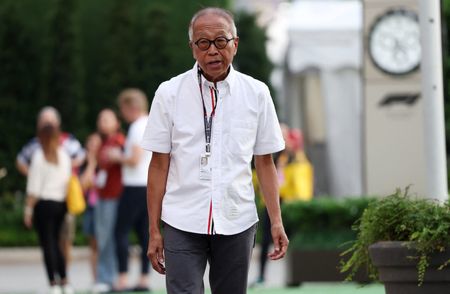By Stefanno Sulaiman and Gayatri Suroyo
JAKARTA (Reuters) – Indonesian President Prabowo Subianto on Friday proposed a $234 billion budget for 2026, forecasting a deficit of 2.48% of GDP, while pledging to eliminate the shortfall and achieve a balanced budget within three years.
The 2026 budget, which targets annual GDP growth of 5.4%, seeks to ensure Southeast Asia’s largest economy is “strong, independent and prosperous”, Prabowo told parliament in delivering his administration’s first budget.
Prabowo took office in October with a 2025 budget prepared by his predecessor. Parliament typically takes about a month to review budget proposals.
Investors are closely watching Prabowo’s fiscal policy due to his potentially costly election promises and past remarks indicating willingness to take on more debt to spur growth of 8% during his term.
“We want to reduce this deficit to as small as possible and it is my hope that one day, in 2027 or 2028, I will stand before this assembly to convey we have succeeded in having a state budget with no deficit,” he said.
This year’s fiscal deficit forecast is 2.78% of GDP.
The 3,786.5 trillion rupiah ($234.39 billion) budget unveiled for 2026 is 7.3% higher than the latest estimate for 2025 spending. Prabowo’s revenue target is 3,147.7 trillion rupiah, about 9.8% higher than this year’s projection.
The proposal is based on inflation at 2.5% and the rupiah trading at an average 16,500 per dollar next year.
Maybank Indonesia economist Myrdal Gunarto described the budget as structurally prudent, but said that President Prabowo had not clarified how the projected surge in revenue would be realised.
GDP growth of 5.4% is above average for the past five years. “This target assumes aggressive growth in investment and exports” against a backdrop of geopolitical uncertainties, said Josua Pardede, an economist at Bank Permata.
FREE MEALS
Prabowo promised to fully implement his flagship free meals programme for 82.9 million children and pregnant women, which he said would cost 335 trillion rupiah ($20.74 billion) and had reached 20 million people so far. He allotted 171 trillion rupiah for the programme this year.
Defence spending would rise by 37% to 335.3 trillion rupiah in 2026, according to the budget document. Prabowo emphasised the need to modernise Indonesia’s military hardware and highlighting the country’s deposits of rare earths that are critical to modern defence technologies.
Prabowo also announced his ambition to transition entirely to renewable energy within the next decade – or sooner – marking a shift away from coal and other fossil fuels that Indonesia relies on for more than half of its power.
A 402.4 trillion rupiah budget is proposed for energy resilience, including subsidies and incentives for renewables, finance minister Sri Mulyani Indrawati told a press conference.
Prabowo budgeted a 25% drop in cash transfers to provincial and local governments to 650 trillion rupiah, a possible move to create fiscal space.
To fund the budget gap, the administration will encourage “creative financing” to boost the role of new sovereign wealth fund Danantara and the private sector, he said, without elaborating.
He made no mention of his predecessor’s project to move the capital from Jakarta to Borneo island, but its continued construction was included in the budget proposal document.
(Reporting by Jakarta bureau; Editing by Martin Petty and Clelia Oziel)











